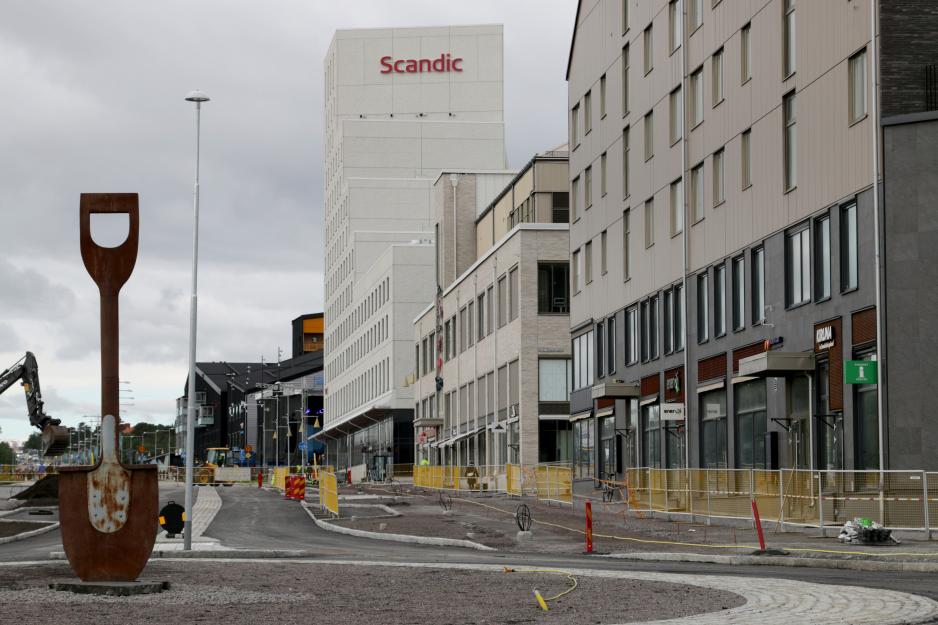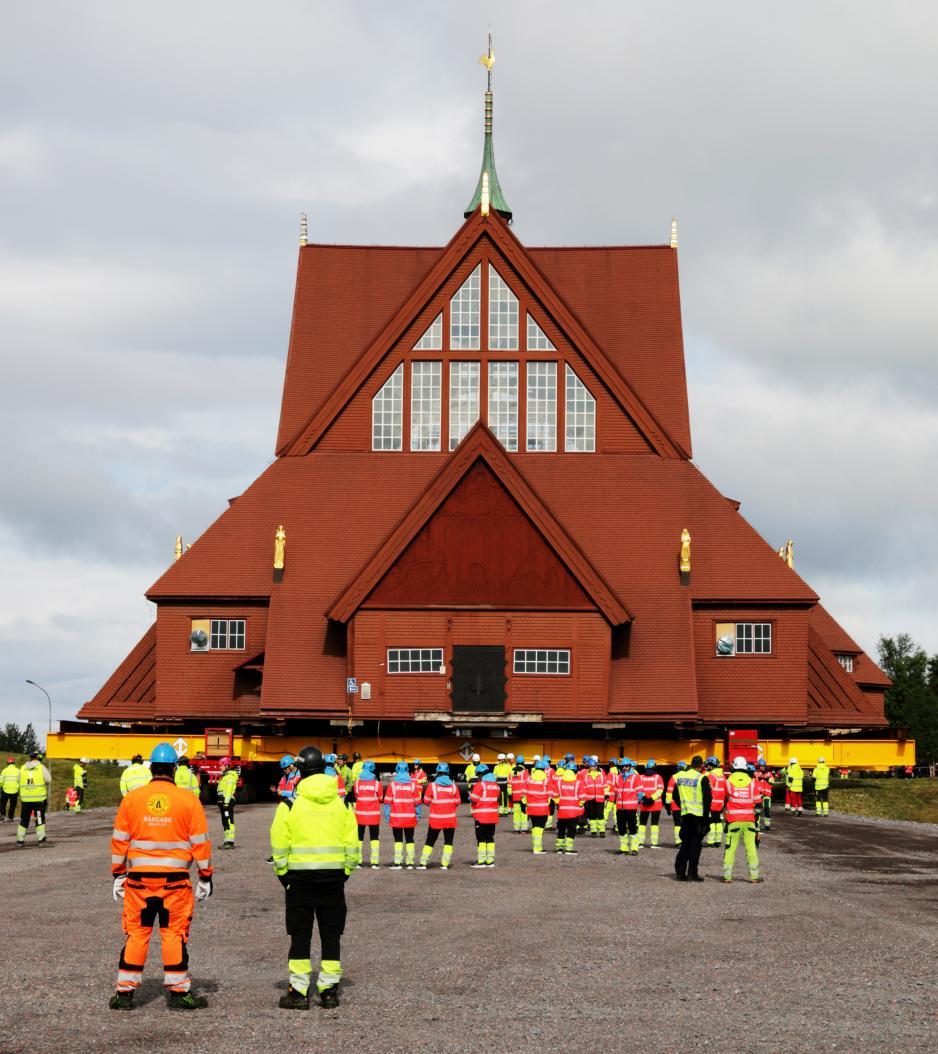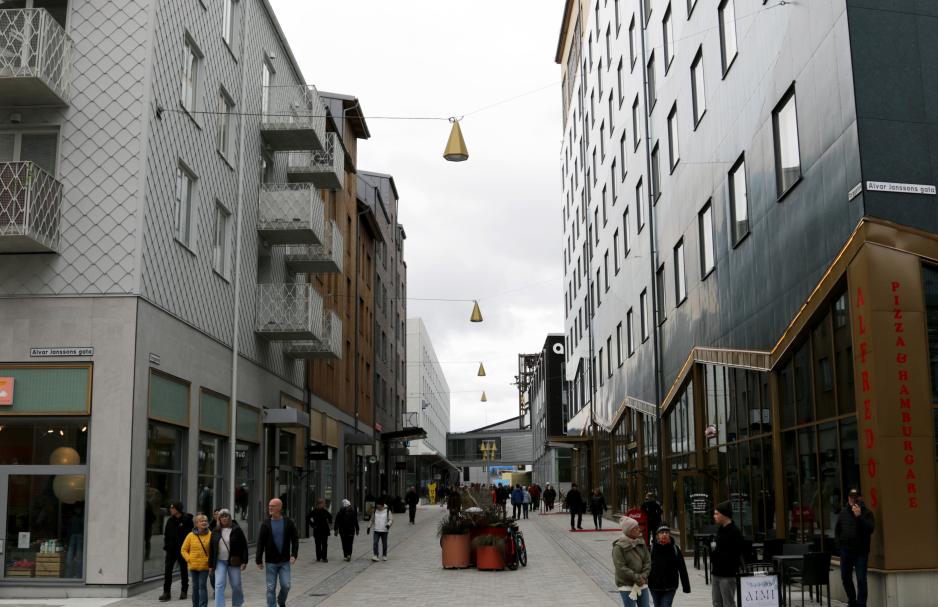Arne O. Holm says The Spectacular Arctic: On Church Walks and Football

Kiruna will be on the move for many years, if not with a shovel. (Photo: Arne O. Holm)
Kiruna: This week, I have wandered and biked around Kiruna, a Swedish mining city, home to 22.4000 inhabitants. The city is moving and even the old, beautiful church has been on a drive. Back in Norway, I've seen an Arctic football club, Bodø Glimt, take its first step into European top football.
Life in the Arctic is much more than military rearmament and the fear of an aggressive Russia.
I have always been fascinated with the mining industry and the unique local communities that are growing with and on the mine's premises. The city of Kiruna is literally built on the iron ore deposit, making the Swedish company LKAB Europe's largest producer of iron ore.
The company accounts for a whopping 80% of the EU's import of iron ore.
Visionary politicians
This is only possible because some very visionary politicians and innovators forced a decision to build a railway between Kiruna and an ice-free port in Narvik on the Norwegian side. Thus, an international market opened to an iron ore deposit far into the wilderness.
The fear back then, as now, is that a railway would make Sweden and Norway open to a Russian invasion.
The mining industry is fascinating for many reasons.
A journey to Kiruna starts in Narvik, over the Norwegian-Swedish border, and into a majestic mountain landscape. The road follows the Iron Ore Line for long parts of the stretch.
Thus, at regular intervals, I spot nearly endless trains loaded with iron ore on the way to Narvik, or empty carts from Narvik, going back to Kiruna. The old station buildings located along the railway, which opened in 1899, are architectural masterpieces.
The mining industry is fascinating for many reasons, not least because it cannot be moved, even faced with modern urgency and haste. This is in stark contrast to battery factories and the technology industry, for example.
The mining companies can also complain about public regulations and conditions, but a mining director cannot close the door and move to America when Donald Trump waves his public subsidies, like some battery directors did. Without success, I may add.
But mining towns also shut down and move. Not for better conditions, but because the mine is empty. Our entire modern community rests on the existence of mines – on deposits of everything from iron ore to rare earth metals, carefully placed in mobile phones and computers.

The audience and the people responsible for the 'church walk' were keeping a close watch. (Photo: Arne O. Holm)
Wanted it differently
In Kiruna in Northern Sweden, they wanted it differently. Here, the whole city is moving, not because the mine is empty, but because the mine needs more room and continues to expand even deeper under Kiruna's old city center.
Therefore, I, and thousands of other people, came to see a moving operation for the ages on Tuesday. A 672-ton-heavy church, named the most beautiful building in Sweden, built between 1909-1912, was moved along a five-kilometer long specially constructed road.
An odd view in many ways, but perhaps mostly a visualization of LKAB's hold on the city of Kiruna.
The entire city center, not just the church, is moving. An entirely new city is under construction. Not just geographically, but also in architecture and organization. The city center consists of tall buildings and street levels where the sun rarely reaches. All familiar stores are in place.
The same goes for international hotel chains.
Without charm, but effective, many would argue. A small Manhattan out in the wilderness. Because if one thing is true in the local community in Norrbotten Län, it is that Kiruna's future goes hand in hand with the state-owned LKAB.
Cost half a billion
Through owner dividends and tax revenue, the Swedish society also relies heavily on the company at times. The profit, and thereby the state's dividend, is sometimes formidable, but has dropped in the past years. In 2023, the operating profit was SEK 16 billion, while it was SEK 9 billion in 2024.
Symbolic politics worth half a billion
So far this year, the company is operating with SEK 4,7 billion. Normally, the company pays around 50 percent in dividends to the Swedish state.
The decline in profits in the past years has several explanations. The Chinese demand has decreased and thereby also prices.
Although LKAB does not export to the US, Trump's economic acrobatics also have its impact on the Swedish company that sells its products in dollars, a currency significantly weakened by Trump.
The investment in an entirely new city and the relocation of the old still demonstrates a long-term belief in the future. Moving the church alone costs SEK half a billion, although such a cost is purely symbolic politics.
The company knows how to get the local population on board with this absurd Arctic adventure.

There is not much that resembles a mining town in the new Kiruna. (Photo: Arne O. Holm)
Does all this happen without local resistance?
Well... There were no demonstrations in Kiruna during the days I was there. There were heated discussions surrounding where the new city center would be located, but not whether it should be moved at all. LKAB lost in the end. A location debate rather than a debate about the realities.
In the newspaper Arbetaren, something as unique as an anarcho-syndicalist newspaper published in Stockholm, Columnist Alex Olofsson, a resident of Kiruna, did indeed call the relocation of the church a PR stunt on the part of LKAB, against the soul of Kiruna.
Company Town
Company Town is a well-known term used for mining towns in which a company, if not formally, but at least in reality, calls the shots. Longyearbyen in Svalbard was such a city. Kiruna still is, without that leading to riots or claims of disregard for democratic rules.
That said, the company will face far greater resistance when it plans to open new mines in search of so-called rare earths.
The impossible is entirely possible in the Arctic.
But that is another story. The transformation of Kiruna is nonetheless a unique and spectacular Arctic adventure.
And as if the church walk in Kiruna was not enough, yet another "miracle" took place in the Arctic, just as the church was parked in its new location.
Bodø Glimt
That also received its well-deserved place in the international media.
From a secluded existence in the lower divisions in 2017, the Bodø Glimt football team, with a stadium north of the Arctic Circle with a capacity of a mere 8,000 spectators, took the first step into the international UEFA Champions League. On Wednesday, they crushed the Austrian league winners Sturm Graz 5-0.
Now, only one away match remains before Glimt is ready to play against big clubs such as Real Madrid, Manchester City, Liverpool, Bayern Munich and Juventus, to name a few.
So if you are wondering where to look on the map in search of the seemingly impossible, the answer is crystal clear. Look toward the Arctic and the High North.
There, the impossible is entirely possible.



